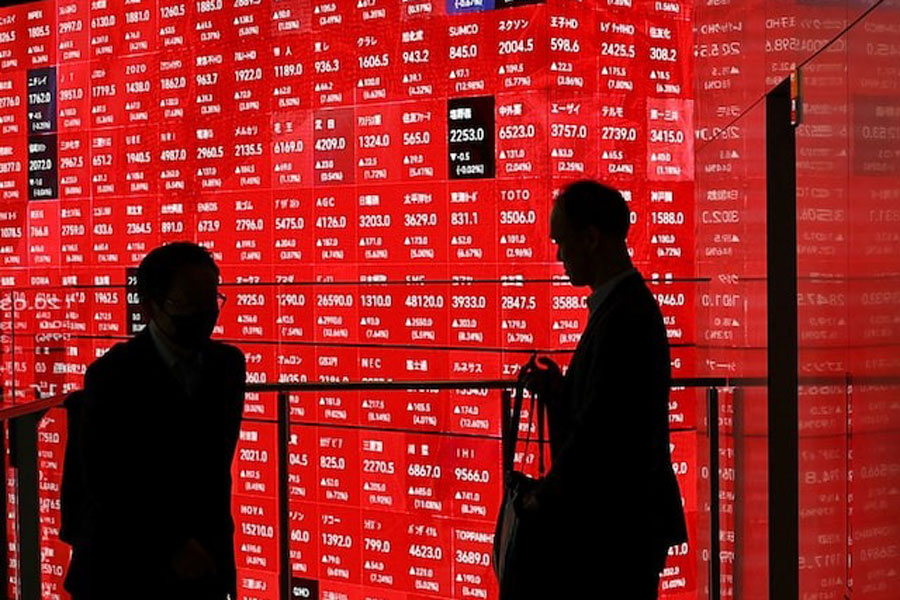
Published :
Updated :

World stocks hovered near their highest levels in six weeks on Friday after a US trade deal with Britain fueled guarded optimism for progress in tariff talks with other countries.
India on Friday offered to slash its tariff gap with the US to less than 4 per cent from nearly 13 per cent now, in exchange for an exemption from President Donald Trump's "current and potential" tariff hikes, Reuters reports, as both nations move fast to clinch a deal.
MSCI's broadest index of world shares (.MIWD00000PUS) gained 0.14 per cent, and remains above levels seen before Trump's 'Liberation Day' global tariff announcements. Germany's Dax stock index hit a record high (.GDAXI), while US stock futures pointed to firm gains on Wall Street ,
"The deal between the US and UK was more style over substance," said Kyle Rodda, a senior financial markets analyst at Capital.com.
The "general terms" agreement leaves in place a 10 per cent tariff on goods imported from the UK but lowers prohibitive US duties on UK car exports. Britain agreed to lower its tariffs to 1.8 per cent from 5.1 per cent and provide greater access to US goods.
"However, it feeds the narrative that the US is looking to bang out rapid-fire trade deals and reduce tariffs - at the margins - and other trade barriers," Rodda said.
Trump pushed back against seeing the UK deal as a template for other negotiations, perhaps, including those due Saturday when US Treasury Secretary Scott Bessent and chief trade negotiator Jamieson Greer will meet China's economic tsar He Lifeng in Switzerland.
European stock markets were broadly higher, with the pan-European STOXX 600 index (.STOXX) up 0.5 per cent.
An investor rush from safe assets such as government bonds into riskier ones such as stocks might mean markets are getting ahead of themselves on optimism, said James Rossiter, head of global macro strategy at TD Securities.
"The trade deal isn't really a trade deal. It's an agreement on a few narrow topics. Still, it shows there is a degree of movement and that some tariffs could be mitigated," said Rossiter. Even so, he added, "tariffs are not going away."
Reaction to the UK trade agreement and the optimistic trade figures that emerged yesterday from China have pushed markets higher temporarily, but "the fundamentals behind what markets are seeing are not as robust," said Rossiter.
Outflows from US stocks continued for a fourth straight week in the week to Wednesday, BofA Global Research said in a note on Friday, while investors bought international stocks, led by inflows to Europe.
Safe haven German Bund prices fell on Friday, driving yields 6 basis points higher to 2.58 per cent, as investors dropped their bonds for assets with higher returns .
US 10-year Treasury yields were up 1.3 bps at 4.39 per cent .
Bitcoin soared to the highest since January, when it hit record highs .
Brent crude added almost 2 per cent to $64 per barrel, following Thursday's 2.8 per cent rally. US crude rallied 2 per cent to $61.17 per barrel, also building on the previous day's surge.
Standard Chartered's Geoffrey Kendrick no longer sees risk sentiment as the main driver for bitcoin.
"It is now all about flows, and flows are coming in many forms," said Kendrick, the bank's global head of digital assets research, pointing to an influx of cash into bitcoin ETFs, as well as buying by so-called whales.
Shares of crypto exchange Coinbase Global (COIN.O) rose over 5 per cent on Thursday after it announced $2.9 billion deal to buy crypto option exchange Deribit. Shares fell on Friday morning 1.1 per cent after a lower first quarter profit report.
The US dollar index , which measures the currency against six major peers, edged away yesterday's one-month peak and was last down around 0.3 per cent.
The euro rose from one-month troughs and was last trading 0.2 per cent firmer at $1.1251, and sterling gained 0.3 per cent to $1.3281.
Mainland China blue chips (.CSI300) closed down 0.2 per cent, while Hong Kong's Hang Seng (.HSI) ended 0.4 per cent higher. Japan's Nikkei (.N225) soared 1.6 per cent and Taiwan's equity benchmark (.TWII) advanced 1.8 per cent, with technology shares the strongest performing sector.


 For all latest news, follow The Financial Express Google News channel.
For all latest news, follow The Financial Express Google News channel.